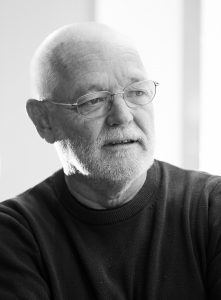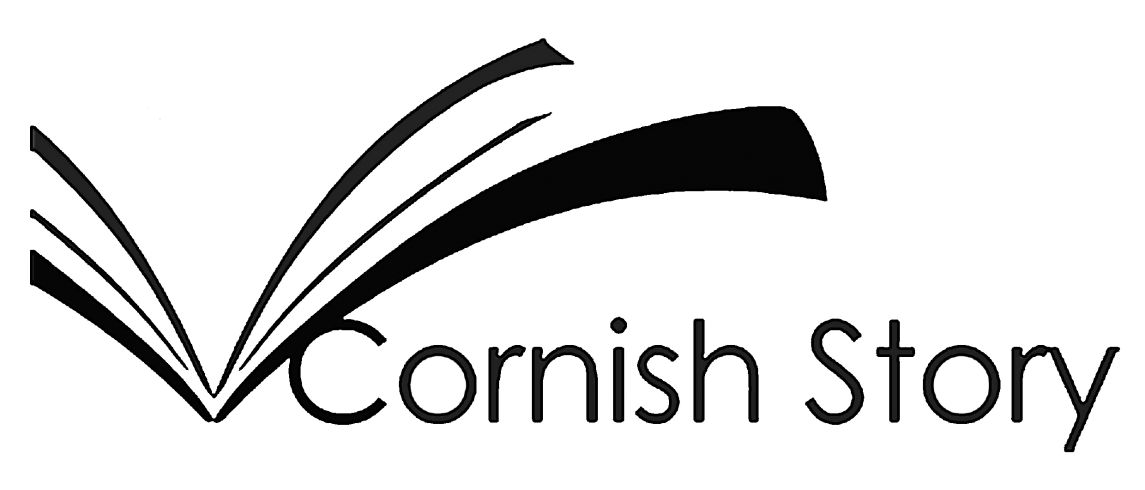A few years ago we were sitting at Predannick on a hot day looking across Mount’s Bay. We were joined by John Bosustow, who had come to see who was taking a rest on his land. We got talking. I asked if he’d always lived on the Lizard. He pointed across the Bay to Mousehole to a farmstead called Bosustow. ‘Tha’s where I come from’. He said. ‘How long you been here?’ I asked. ‘O! Couple of hundred year I spawse!’ Much later, I discovered a family tree researched by my Mother, Joan Biscoe. I was suprised to find that, in 1911 my relative, John Goodman, had married Mary Bosustow of The Lizard. They left Cornwall and settled in New Zealand. Mary died in 1962. Funny old world. I always wondered why that chance encounter at Predannick just sticks around in my head. Bert Biscoe.
(An audio version read by Bert Biscoe)
The thorn found its spot,
Slap-bang in the tip,
The index tip, right hand,
Which takes the root note
Of any chord, and points
The way of melody,
A spriggan tip, half-curved
In arthritic willingness
To work and please, to
Indicate across the glaring
Bay the dip behind a village,
The narrow eye and simple
Words squeezed to sound
A larynx of day, a surrender,
A giving-way – ‘that is
The hamlet which bears
The name beside my dates
In registers and accounts –
Who knows now why
We moved. I don’t know
If they came by road
Or by boat across the Bay,
Under the nose
And magistrate’s gaze
Of the Mount. It wasn’t
To improve their land,
That’s for sure! I look
Over there. Now and then
I stop my ranging round,
And sit just here to stare
Over the water and light –
If I could I’d stop
A cormorant, buy it lunch,
And ask it what it knows –
O! I have seen them,
Stealthy and quick,
Just above the waves,
Slip unperturbed
From harbour rock –
Marker of Spanish graves –
To thump-thump the air
And bear a covert signal,
A coded cypher scroll,
Reports of observation –
For none can know the mind
Of navigators, skippers
And traders on occasion
Enquiring for direction,
Sepulchral tudor caps
And wide-brimmed puritan
Mitres, darkly haloed
To shade the earnest faith
From salt-spray
And inquisition of the sun,
And fresh from Newlyn shute
To be gone to argue
And article a republic
Out of buffalo plains
And tribal burial grounds –
None but a cormorant
Watching on the rock
Can know such things –
I have always ploughed
As my father’s father
Always inwardly vowed,
Around the upright stones,
And paid my tithes
In labour to clear the yard
Of garlic, to ease
The digestion of ghosts
Whose endless suppers of clay
Fill the silence
With suggestion, and passing
The time of dawn-drained
Dusks kneaded and turned
Into urns and eternal tasks,
I take a clutch of flowers
To my queen of kitchen’s domain
To pouch beneath her chin,
In case the old woman
Who came a-calling had left behind
Some fragment or
Fingerprint of original sin –
We’ve had a car
Since twenty-three – for
Market and the bank,
And driving brides to weddings,
And to wave au revoir
To the marching khaki rank,
The dread of telegram,
The coming home and healing
Of an unseen sleepless scar,
And silence behind the plough,
The harvest of anxiety,
The inner crying neck, the hope
Of fortune from a wreck,
Temptation to go to sea,
A glance across the mowhay
Enough to know ‘All’s well!
There’s peace and quiet
And numbness
Down there in speechless Hell –
The bugle, the leaded list
And the name I share
With the dip behind the village
Across the Bay, over there,
Not in the solemn column –
Despite the means
And encouragement of friends,
I have never been,
Never ventured on Sunday drive,
To meander unfamiliar
Yet back-of-my-hand lanes
To stare through bars
Of bramble gates into eyes
Of windows, over gables
And flaking fascias under slates,
To see old generations
Move behind the nets,
Bring water and towels
And lower boxes over stairs –
It was not far, but yet
It is a world away – a world
At least – and if I went
What would I find? Not
So much between the posts
Of gateways which one of mine
Undoubtedly set to speak
With menhir eloquence
To any and all who lean
Or lift the harvest latch
Or call the fattening fortune
Home – what would I find
Beneath the garlic pouch,
The corner patch of celandine
Left for spriggan’s
Moonlit dance for lucky corn
And dry September’s straw –
Myself, I fear, and others
Too near to be mere brothers,
Sprites and echoes,
Cold breaths of seasons
Measured in lichen letters
Across a lurch of slabs,
Of epitaph verses, of dates
And biblical names, a line
Perhaps of Deuteronomy
Or Ezekiel or Revelation
Along the foundation strip
Of a northern aisle’s narrow
Stained depiction
Of crucifixion and ascension –
The truth of exile across the Bay,
It’s reasons beyond the aye and nay,
Reasons indeed to go
Anywhere but there, that dip
Behind the brow of Mousehole,
In the nape of Kernow’s neck –
Despite, or perhaps because
My reluctance brings me here
To show you
What is of little use to you,
Though I could never visit
Or wander amongst the graves,
Or inhale the gatepost spirit,
Or mutter under the eaves –
Though I know it’s there,
And centuries lie between us,
Though it feels like yesterday –
How Time circles it Square! –
I’m glad I have always
Had it in my circling sight,
For someday,
Or rather night, I might
Creep away, and return
To look across the invitation
Of this bay
To land which bears the clay
Of my hand, and thus, trapped,
I might pass back and forth,
Five bars latched between
Twin posts and shut
To keep the restless self
Grazing and lying, waiting
For rains that turn the blood
To water which drains
To freshen the harbour,
To signal to an apocalyptic
Cormorant the moment
To begin its covert flight –
That’s where I come from,
And over there, a cousin,
Pointing along a crooked finger,
To declare: ‘That’s where
I come from – over there!’
That’s why I come here
To sit quite still and stare.
 (Photo Steve Tanner)
(Photo Steve Tanner)
Vyager gans Geryow (Bert Biscoe) lives in Truro. He is a poet and songwriter whose work draws on his interest in history, politics, social justice and language. He represents the people of Boscawen Division on Cornwall Council. The Division was formerly called ‘Moresk’ – an unbroken link from civic administration to the hurried escape of Tristan and Iseult from the vengeful wrath of King Mark – Bert tries to invest Cornish values into the demand of modern life. His work is fun, and best read aloud – which he does whenever the opportunity arises, especially with fellow Cornish poet, Pol Hodge. ‘Living in Trurra’ he says. ‘Means that there is a constancy of running water beneath your feet – there are two clocks which ring the hours dissonantly and out of step – a good environment for poems to flourish in the cracks and shadows. Nowadays, the mullet listen attentively in the lee of the Old Bridge’.
